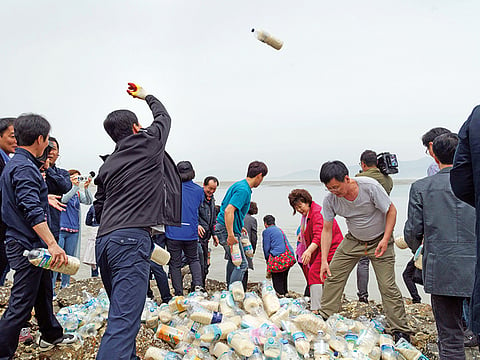Defectors send bottles of food and facts to North Korea
Seoul government removes border loudspeakers following a rare summit with Pyongyang

GANGHWA, South Korea: North Korean defectors sent water bottles filled with rice and K-pop-loaded USB sticks floating towards their homeland Tuesday, even as the Seoul government removed border loudspeakers following a rare summit with Pyongyang.
The North’s leader Kim Jong-un and the South’s president Moon Jae-in agreed last week to “completely cease all hostile acts” along the Demilitarised Zone from May 1, including loudspeaker broadcasts and leaflet balloon launches.
But former North Korean political prisoner Jung Gwang-il and other activists tossed bottles into the sea from an island, hoping the tide will carry them northwards.
Seoul is playing into Pyongyang’s hands by depriving ordinary North Koreans of much-needed information, Jung said.
“What is one thing that Kim Jong-un hates the most?” he asked. “It’s North Koreans becoming aware of the reality.”
The defectors have been throwing hundreds of bottles filled with food, cash, medicine and memory sticks into the sea twice a month for more than two years.
There is no definitive way of verifying whether the items have been received, but Jung said the South’s coastguards have told him the bottles are often retrieved by North Korean fishing boats.
The USB sticks contain movies, current affairs programmes, and K-pop music videos — carefully selected by Jung to include female musicians in revealing outfits.
‘Huge mistake’
“It shows what freedom is,” he said. “It’s no problem in South Korea but banned in the North. That’s what we want to show.”
A survey conducted in 2015 said 81 per cent of North Korean defectors had watched foreign films on USB sticks before they fled the country.
As the activists tossed the bottles into the sea, the South’s defence authorities began removing loudspeakers along the Demilitarised Zone to implement the Panmunjom Declaration agreed at last week’s summit.
The high-decibel loudspeakers have been blaring K-pop music and South Korean news towards the North’s border troops.
US activist Susan Scholte called Seoul’s move a “huge mistake”.
“I think any way that you can get information in should be increased, not diminished,” Scholte told AFP.
She added: “Any information that you can get into North Korea is a peaceful, non-violent way to bring about awareness and change.”
Despite the agreement between the two Koreas, Jung said he would continue his efforts to penetrate the notoriously closed regime, eight gigabytes at a time.
“One USB stick can bring about change for a hundred people,” he said.
Sign up for the Daily Briefing
Get the latest news and updates straight to your inbox



